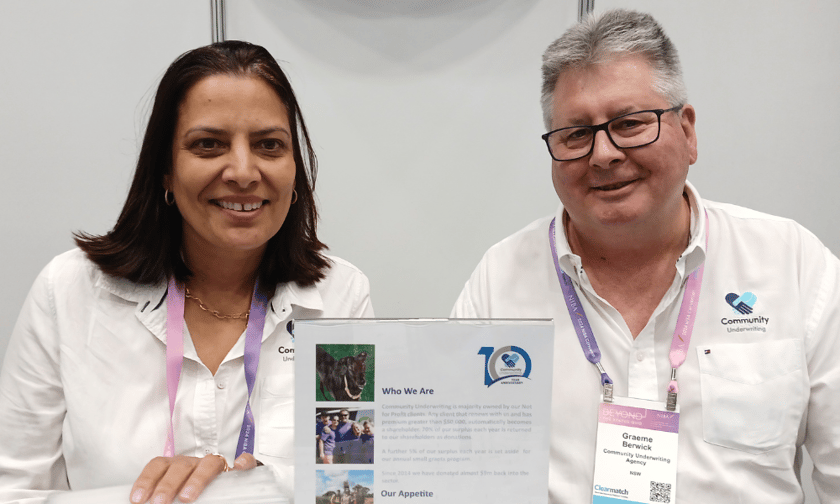

An Australian charity that delivers old people meals has developed a unique insurance model with refunds and grants. Coverages are offered through an agency, Community Underwriting, which has about 4,000 not-for-profit clients through brokers across the country.
As traditional insurance firms face increasing challenges from natural catastrophes, economic uncertainty and political instability, could this be a model for a more sustainable industry?
“We've grown pretty exponentially,” said Graeme Berwick (main picture, right, with chief underwriter, Sarogini Millott), director of Community Underwriting.
Berwick said the origins of the model go back about 30 years. At that time, charities in Australia started struggling to find insurance covers.
“Liability insurers were pulling out of the market and, for whatever reason, not-for-profits were on the nose and not seen as a good risk,” he said.
Berwick said this crisis prompted Meals on Wheels New South Wales (MOW) to work with a broker to find a solution. The charity and the insurance professional joined forces, found coverage and MOW took a share of the broker’s commission by finding new not-for-profit customers.
“That grew modestly for a number of years,” he said.
Berwick – a board member with MOW since 2004 – said a big impediment to growth was not-for-profits needing to sack their broker and sign up with MOW’s to get covered.
Berwick had a better idea for his charity, which gave them more financial control. He proposed it to the MOW board in 2013.
“The underwriting agency was seen as a way to say - any broker, come to us,” he said. “Also, as the underwriting agency, we control the client base, the funds, the commission and share profits if we make money for insurers.”
The business model was quite unique.
“So any not-for-profit that pays premiums worth more than $50,000 becomes a shareholder,” he said.
Today they have nearly 30 shareholders, said Berwick, after starting with six.
Under Australian regulations their agency is what’s called a not listed private company. Meals on Wheels is the majority shareholder and the largest investor.
All shareholders get a proportion of surplus revenue refunded to them. A total of 75% of Community Underwriting’s surplus revenue – after salaries and general expenses are paid – is refunded. Seventy per cent (70%) goes back to shareholders.
For the rest of the clients, who form the vast majority, there’s the small grants pool.
“We knew that we had thousands of clients that weren't spending $50,000 so we set aside another 5% for the small grants pool, which we've been doing ever since 2014,” he said.
The 75% refund figure was considered the maximum tolerance level, said Berwick, following legal advice about the business structure.
The director said his idea was partly inspired by the mutual concept in the US. However, in Australia those types of mutuals don’t exist, he said, because local regulations protect not-for-profits from taking on risk.
“So we’re not a mutual insurer,” said Berwick. “We have two insurers as our security, which means that the only real risk is the loss of future revenue.”
The first hurdle was convincing the MOW board.
“It had to get through a very nervous Meals on Wheels board who didn't necessarily understand the complexities of it,” said Berwick.
However, as part of a strategic review the board found that the old insurance scheme was stagnating, he said, just when they were trying to become less reliant on government funding.
“So it was seen as a way to change and improve what we did with insurance and expand it,” he said.
Ultimately, the board agreed to provide some seed capital to form Community Underwriting and hand over the small book of clients from their previous broker.
Berwick said support from the insurance company, Calliden, was instrumental in getting the idea into action.
One big challenge, he said, was not losing their clients’ business while they transitioned to become an underwriting agency.
“We had about $2 million worth of premium, all due on June 30 and we kicked off on February 14,” said Berwick. “We had to set up the business, get our license and jump through a whole bunch of hoops, employ people, and then be ready for June 30 and hopefully not lose too much business.”
He said they didn’t lose any.
Berwick said this model has resonated with brokers for being different. One big reason, he said, is the small grants program that all premium holders can apply for.
In 10 years that program, with only 5% of the firm’s revenue, has given $10 million worth of grants to dozens of charities including animal shelters, men’s sheds and women’s refuges.
“There's definitely been hiccups along the way,” said Berwick.
The first one was when their insurer went out of business in 2015. He said after “scurrying around” they were lucky to find Berkeley Insurance who liked the business model. They’ve been with them ever since.
COVID-19 was another tough period.
“A lot of charities just couldn't operate during COVID because they didn't have the funds,” said Berwick. “We had loads of cancellations during that period and reduced revenue.”
However, since then, he said, there’s been a resurgence of charities.
“New ones are coming on all the time,” he said.
Berwick said the agency has grown that initial $2 million in revenue to $23 million. Staff have increased from a handful to 18. Their brokers are arranging covers for about 4,000 charities Australia-wide.
IB suggested that many insurance professionals are, understandably, very focused on profits. Have they had to sacrifice profits to operate their agency model?
“We don't drive Maseratis but we are returning profits to our insurers, which means we can keep the premiums at a reasonable level and that returns profits to us,” said Berwick. “We're definitely a lean, but well-run, business.”
What do you think of this Meals on Wheels insurance model? Please tell us below
